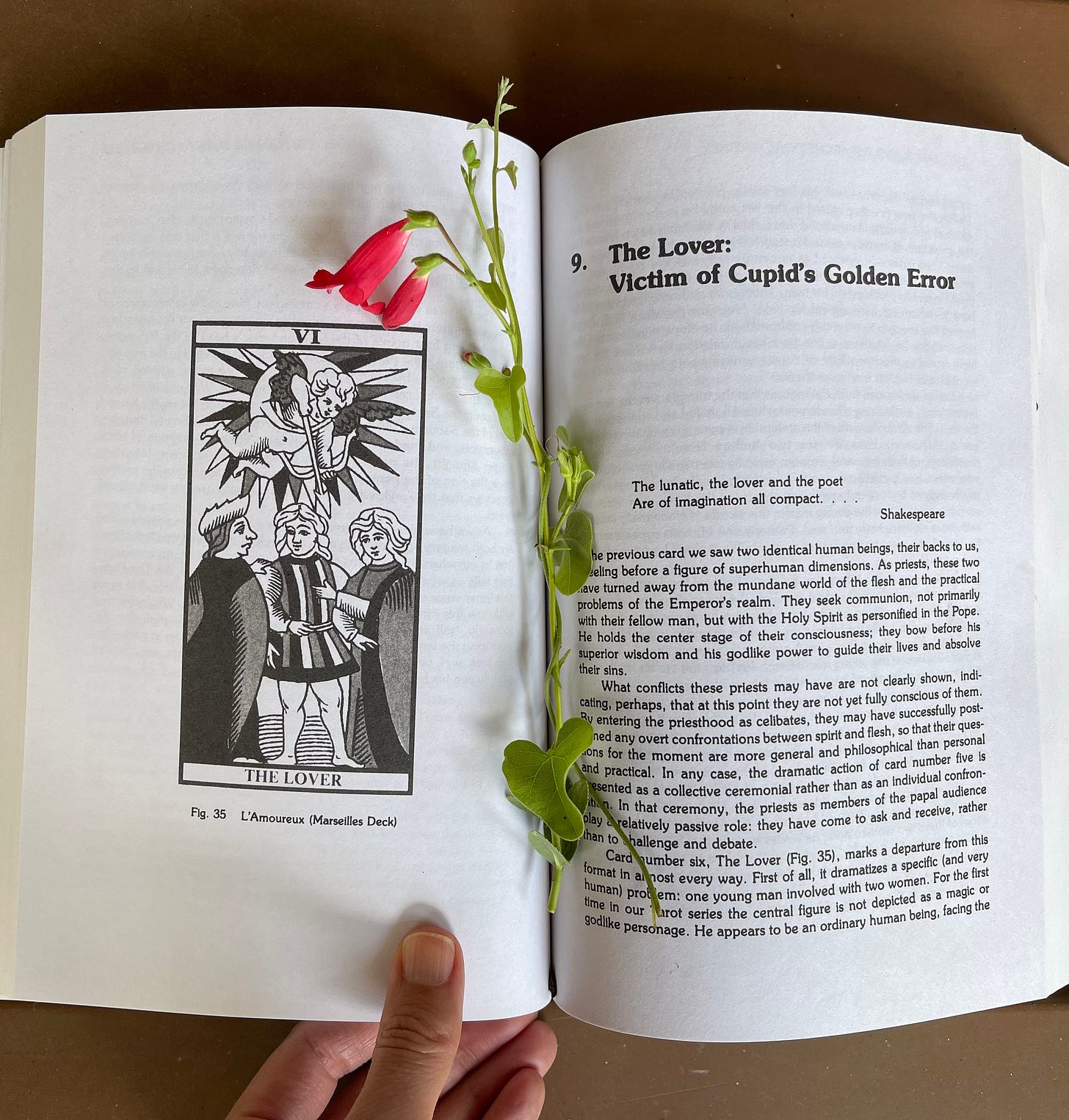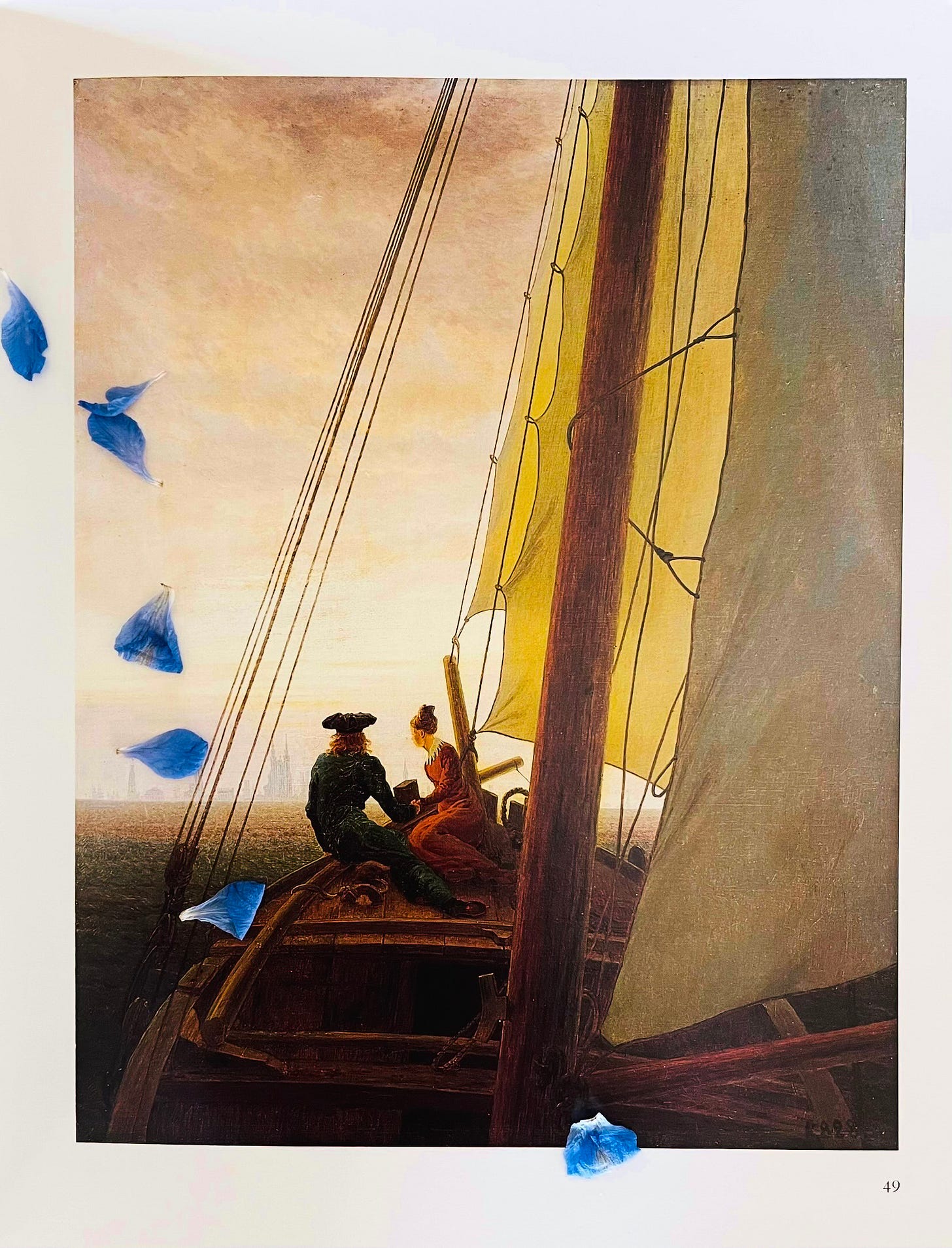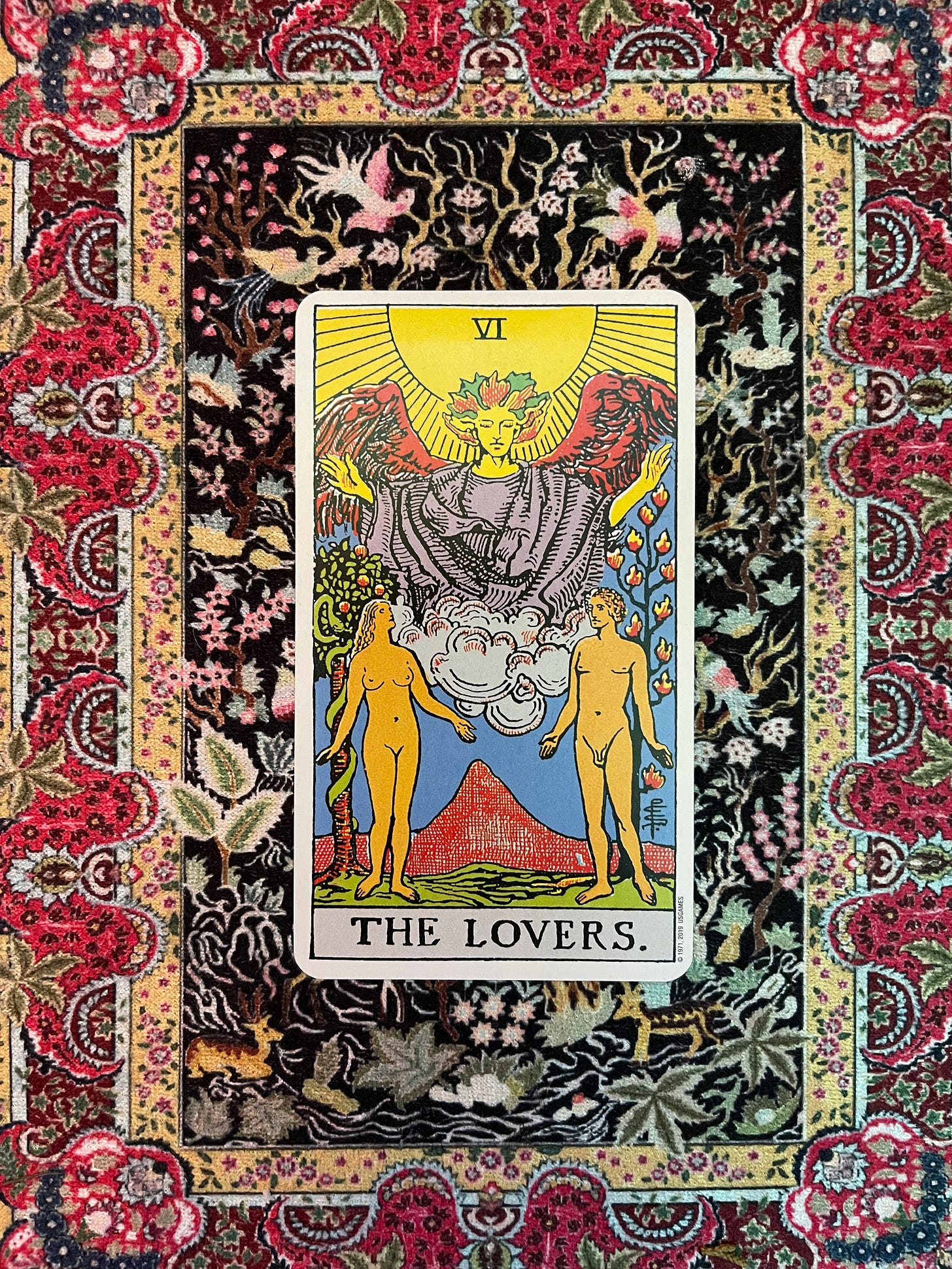The LOVERS: Your Soul wants to Ship You
A Tarot Offering for Gemini Season

My tween daughter and I are cracking through a summer reading challenge. The first book on my list is the initial installment of Junie’s favorite series: Keeper of the Lost Cities. There’s a lot going on in Shannon Messenger’s middle-grade fantasy novel: secret societies, dinosaur sanctuaries, and alchemy exams proctored by Tolkeinian elves. It’s all fun, but what I like most is to guess at how Shannon will ship Sophie, the book’s human-raised elf prodigy. (For those who don’t have a Gen Alpha daughter to translate, this kind of “shipping” has nothing to do with UPS or ports of call. You "ship” two people you hope will form a romantic attachment. As in relation-ship.) Junie and I are agreed: though Sophie has plenty of options, she would do well to choose brainy, loyal Dex, the overlooked underdog of the story. Just—please Shannon—anyone but golden boy Fitz. Movie star smiles and gilded castles are so 1900s.
I find myself asking why it’s so fun to speculate on Sophie’s romantic side-plot? After all, we’re supposed to be living in a post-romantic age. My generation set the 21st-century task of unraveling the chains of love-lorn delusion inherited from Disney et al.
But, Eros, I just can’t quit you.

In stories as in life I want it all—careful research, cultural commentary, expansive world-building, surprising prose. But if you can do all of that alongside one heart-felt vision of reciprocated affection that upends a status quo? That’s pure gold to me. An adolescent pleasure that I’ve never outgrown. A longing that crackles in the air whenever I pull the LOVERS card from my tarot deck.
The First Taste of Love
Rachel Pollock, who modernized the tarot with her seminal books in the 70s and 80s, calls the LOVERS card ‘a parable for adolescence.’ Why? Because during our coming-of-age years, Eros’s driving arrow fast-tracks our process of individuation, offering us a counter point to the Self as understood within the comfort and confines of family. With the LOVERS we leave home. We step into the wilderness of relationship—and open the field to who we may become. The stakes are incredibly high; both because our love may not be returned and because the social norms we inherit may not sanction the love we practice.

I think of LOVERS energy, like adolescence, as momentary, propulsive and transformative, life-affirming but potentially destructive. The LOVERS may be populated by people, but it’s often less about a person than a feeling, a swell of attraction that can be so strong as to short-circuit our learned habits and push us toward unprecedented leaps of faith. Think back on your own early attachments, you can probably see evidence of this compulsion. We “fall” in love and sometimes break upon impact. But on the soul level…well, it’s all part of the process.
In its archetypal form, the LOVERS promises disruption, hence the Garden-of-Eden expulsion imagery in the Rider Waite Smith Tarot. The fated union of opposites destroys in its revelations, transforms in its fires. In this reading of the biblical myth, we’re not witnessing a comeuppance for sins committed. Adam and Eve are posed in the midst of spiritual revolution—one of divine providence (if that angel above has anything to say about it). The apple of experience moves the lovers from the ease of childhood into the shaky terrain of adult uncertainty. From here on out, nothing is guaranteed.
This “tale as old as time” only really gets old when love fails to break the bonds of generational expectation and starts to reek of self-suppression. (Thus our current-day crusade against patriarchal marriage-plots *keep it up*). Literature’s quintessential LOVERS—Romeo and Juliet, Tristan and Iseult, Elizabeth Bennet and Mr. Darcy—knew the collective importance of their coupling. Their stories show us that to love is to edge closer to freedom, self-expression, and a new way of being in an often repressive world.
When Junie and I debate about which ship will win out in Keeper of the Lost Cities — we’re really talking about what kinds of freedom we yearn for. If not in life, then at least in the story world, which has its own rules to be broken.
The Sacred Libido
When we pull the LOVERS card, we may be pulled in turn by passions that we can’t release, no matter the circumstance. Often we want some kind of external affirmation of an internal wish—a book deal, an award, a finished project, a kiss. (All of the above, please). Lindsay Mack reminds us that what we long for in LOVERS, we already possess within ourselves…but we are a little bit like Ariel in this moment: we’ve got everything, but who cares? We want more.

Rather than write off the stirrings of our heartstrings, these impulses are here to illuminate the aligned trajectory of our soul’s growth.
The LOVERS card signals an opportune moment to examine your desires, your secret passionate interests. Preferably without judgement. What golden apple in the boughs of your garden begs to be bitten? What are you ceaselessly reaching for? Do you really want it? Don’t be afraid of what comes up here. There’s no wrong answer and you don’t have to act on anything that you uncover. The LOVERS isn’t a call to live by the whims of libido. Desire stems from the subconscious and—like dreams—love’s visions have to be unpacked to reveal the soul’s longing that generates them.
As Jungian analyst Lisa Marchiano says: “When we fall in love with somebody, when the arrow of Eros lands for us, part of what’s undoubtedly happening is we are projecting part of our own soul onto that other person. It’s some potential that’s unlived in us…It is an invitation to the depths…We first think it’s about the other person, but really we’re being introduced to ourselves.”1

Try this: Consider the characters, people, or ways of being that you find crush-worthy. What latent elements of yourself might these lovers be asking you to embrace? If you think you’re too old for limerence (you’re not) consider how this energy plays out in platonic relationships, too. My grad school friends and I would confess to “academic crushes” on thinkers that shaped the trajectory of our values and methods. What about:
the friend crush that pushes you to become more out-going?
the mentor crush that invites you to take your work in a new direction?
the artist crush that pushes the bounds of your creative capacity?
When we feel a tug of longing for another person, a strong affinity for the way that they live or how they help us to see ourselves anew, we are invited into sacred growth. When we resist the urge to separate from our desires, they support us. As in Audre Lorde’s “Uses of the Erotic,” desire becomes a source of joy and power. Libido operates like an arrow pointing us toward spirit-aligned expansion.
Sehnsucht — Romance with a Capital ‘R’
The German department where I studied for my PhD was very Enlightenment-focused. Our scholarship was materialist in nature—heavily backed by historiography and citation, the metrics of literary academic vigor. Romantics were discussed with an indulgent smile, their methods rejected with a bit of an eye-roll.
But the bold mysticism of Novalis and Hölderlin rang some kind of inner gong in me. These poets basked in the wonders of nature, sought the divine in the fragmented space of symbolic language, and rallied around the subjective experience of the numinous. Sehnsucht was their touchstone, one of those German concepts that doesn’t quite have an equivalent in translation, but means something like “spiritual longing.” This drive toward the sublime felt at home in me—like the sinews (Sehne) linking muscle to bone. And even though there is a good reason to differentiate (R)omance from (r)omance, I feel both resonate when I’m reading a good love story.

I may have squirmed through the love scenes in Rebecca Yarros’s wildly popular Fourth Wing, but I don’t think we should discount the draw of a little bodice-ripping. Stalwart Goethe wrote and collected his own blush-worthy verses in a folder he titled ‘erotica.’2 The Bible makes use of Eros’s power with its Songs of Solomon. The romantic, erotic impulse, as with other forms of longing, offers a portal to the divine: a vehicle towards spiritual union that transcends rational measure or score.
Ship yourself.
So much of life presents as a challenge—we need moments of passion to propel us through the hard work of being alive; LOVERS energy speaks to the kind of fiery impulse that makes us willing to lose a night of sleep just to be swept up in its embrace.
What shape does your dream lover take this Gemini season? A potential partner, a new hobby, a deepening friendship, a plan to travel to a far flung destination? How does the object of your affection speak to your own growth edge? Your purpose? Your innate longing for the divine?
Try this tarot spread to unlock the LOVERS passion that burns in you this season:
CARD 1: What is here to sweep me off my feet?
CARD 2: How do I want to experience passionate love?
CARD 3: How might I give myself what it is that I am truly longing for?
Summer Seeking
Starting Saturday, I’m running away for a few a weeks of soul-searching with my family—call it the pull of Sehnucht toward distant shores. I may not be as responsive to comments, but I would love to hear from you and will be back around before you know it. I also won’t have an artist interview to share this month, but I plan to return in early July with a reflection on the Chariot for Cancer season. May love find all of us as we journey on in the meantime.
From This Jungian Life. Podcast Episode, Feb. 15, 2024. “Unrequited Love: can Eros be revived?” https://thisjungianlife.com/unrequited_love/
This from Andrea Wulf’s Magnificent Rebels: The First Romantics and the Invention of the Self. Thanks, Charlie Cross, for recommending Wulf’s book!


